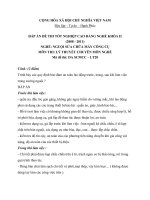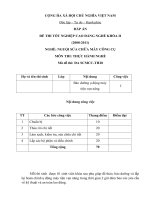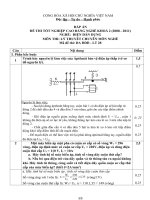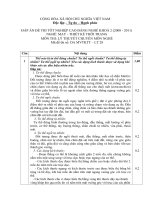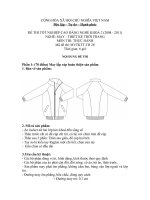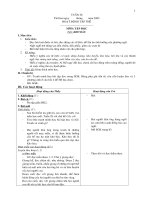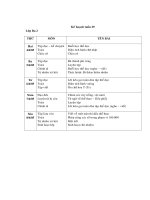PASSAGE 28
Bạn đang xem bản rút gọn của tài liệu. Xem và tải ngay bản đầy đủ của tài liệu tại đây (37.57 KB, 3 trang )
PASSAGE 28
You have read about Romulus and Remus whose culture shock came when they went back to the
world of human beings after being raised by a wolf. Tarzan's culture shock came when he discovered that
he was not a "white ape” but a human being. Emily Carr preferred the culture of the First Nations people
and the life she led on her explorations to the dresses and polite conversations of her own culture. You
now know that First Nations culture did not include school or even business activity, people spent most of
their time in nature or around the fire of their home talking, telling stories and making the things they
needed to survive.
Psychologists tell us that there are four basic stages that human beings pass through when they enter
and live in a new culture. This process, which helps us to deal with culture shock, is the way our brain and
our personality reacts to the strange new things we encounter when we move from one culture to another.
If our culture involves bowing when we greet someone, we may feel very uncomfortable in a culture that
does not involve bowing. If the language we use when talking to someone in our own culture is
influenced by levels of formality based on the other person's age and status, it may be difficult for us to
feel comfortable communicating with people in the new culture.
Culture begins with the "honeymoon stage”. This is the period of time when we first arrive in which
everything about the new culture is strange and exciting. We may be suffering from "jet lag" but we are
thrilled to be in the new environment, seeing new sights, hearing new sounds and language, eating new
kinds of food. This honeymoon stage can last for quite a long time because we feel we are involved in
some kind of great adventure.
Unfortunately, the second stage of culture shock can be more difficult. After we have settled down
into our new life, working or studying, buying groceries, doing laundry, or living with a home-stay
family, we can become very tired and begin to miss our homeland and our family, girlfriend/ boyfriend,
pets. All the little problems that everybody in life has seem to be much bigger and more disturbing when
you face them in a foreign culture. This period of cultural adjustment can be very difficult and lead to the
new arrival rejecting or pulling away from the new culture. This "rejection stage” can be quite dangerous
because the visitor may develop unhealthy habits (smoking and drinking too much, being too concerned
over food or contact with people from the new culture). This can, unfortunately lead to the person getting
sick or developing skin infections or rashes which then makes the person feel even more scared and
confused and helpless. This stage is considered a crisis in the process of cultural adjustment and many
people choose to go back to their homeland or spend all their time with people from their own culture
speaking their native language.
The third stage of culture shock is called the "adjustment stage". This is when you begin to realize that
things are not so bad in the host culture. Your sense of humor usually becomes stronger and you realize
that you are becoming stronger by learning to take care of yourself in the new place. Things are still
difficult, but you are now a survivor!
The fourth stage can be called "at ease at last". Now you feel quite comfortable in your new
surroundings. You can cope with most problems that occur. You may still have problems with the
language, but you know you are strong enough to deal with them. If you meet someone from your country
who has just arrived you be the expert on life in the new culture and help them to deal with their culture
shock.
There is a fifth stage of culture shock which many people don't know about. This is called “reverse
culture shock". Surprisingly, this occurs when you go back to your native culture and find that you have
Page 1
changed and that things there have changed while you have been away. Now you feel a little
uncomfortable back home. Life is a struggle!
Question 1. What topic does the passage mainly discuss?
A. Culture differences.
B. Culture shock.
C. Ways to overcome culture shock
D. The stages of culture.
Question 2. According to the passage, when does culture shock come?
A. When people went back to human world.
B. When they discovered that they are human beings.
C. When they enter and live in a new culture.
D. When they need to survive.
Question 3. What sentence is TRUE about "honeymoon stage”?
A. We may be tired because the thrilling environment.
B. This stage only lasts for a short time.
C. We are excited about knowing new things in the new environment
D. This stage is strange and exciting.
Question 4. What does the phrasal verb “settled down” in paragraph 4 mean?
A. applied oneself to
B. kept in touch with
C. kept up with
D. looked forward to
Question 5. According to paragraph 4, what sentence is INCORRECT about the "rejection stage"?
A. This stage is more difficult than the first stage.
B. Every little thing you face abroad seems bigger and more disturbing.
C. Some people may develop unhealthy habits in this stage.
D. Many people may not want to come back their homeland anymore.
Question 6. What do the writer mean when saying "now a survivor" in the third stage?
A. You are still alive.
B. You can overcome the culture shock in the environment.
C. Everything now is not difficult for you anymore.
D. You have known that things are not bad in the new culture.
Question 7. Why do people feel comfortable in the fourth stage?
A. Because they can deal with most difficulties happening in the new place.
B. Because they are getting used to having problems.
C. Because they can be the expert about being accustomed to the new culture.
D. Because they can help many people to overcome culture shock.
Question 8. Why do people reverse culture shock when they come back to their homeland?
A. Because they want to live abroad.
B. Because both you and everything in your homeland have changed, so you are no longer familiar
with it.
C. Because you are uncomfortable when you come home.
D. Because many people don't know there is a "reverse culture shock".
Page 2
ĐÁP ÁN
1-B
2-C
3-C
6-B
7-A
8-B
4-A
5-D
Page 3
